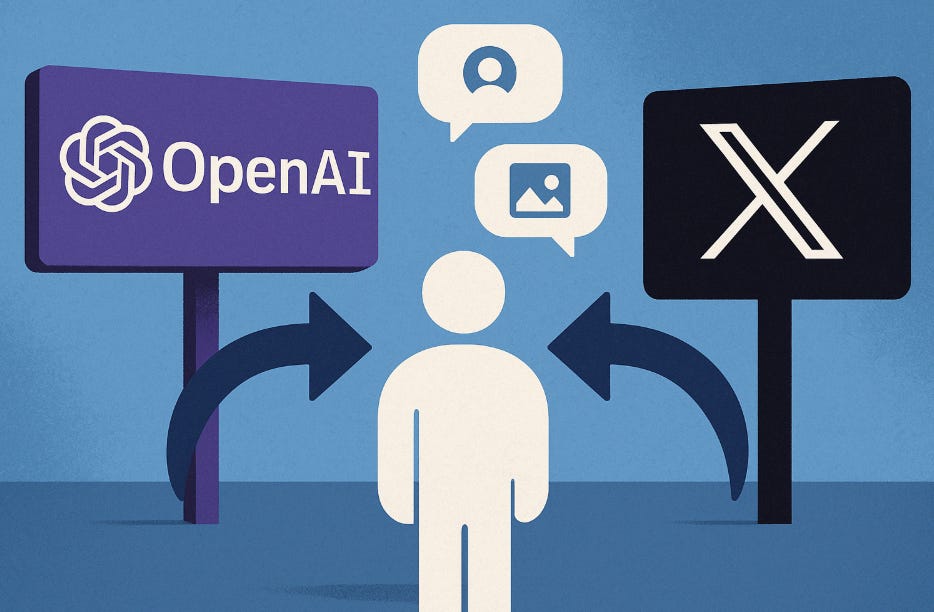🌍60% of Top U.S. AI Startups are Founded by Immigrants.
Plus: AI Is Disrupting Music—And Redefining Creativity.
Subscribe and do not miss the latest in AI and Tech. Plus Join a vibrant community.
Mid-week and the drama doesn’t stop. Chipmakers are hit again—this time with over $5.5 billion in impact from new tariffs for some. Meanwhile, 60% of top U.S. AI startups were founded by immigrants—but sure, let’s slash university funding and tighten immigration even for professionals anyway. Plus, more news, breakthroughs, and insights in this edition. Let’s dig in.
60% of Top U.S. AI Startups Founded by Immigrants.
🧰 AI Tools - For Educators and Professionals.
🧠 Beginner-Friendly AI Courses.
AI Is Disrupting Music—And Redefining Creativity.
📰 News and Trends.
OpenAI Building a Social Media App to Rival X.
60% of Top U.S. AI Startups are Founded by Immigrants.
A new analysis by the Institute for Progress reveals that 60% of the top U.S.-based private AI companies—25 out of 42 on Forbes’ AI 2025 list—were founded or co-founded by immigrants. Founders come from 25 countries, with the most from India (9) and China (8). Notable examples include OpenAI (co-founded by South African–born Elon Musk and Russian-born Ilya Sutskever) and Databricks (founded by immigrants from Iran, Romania, and China).
The findings highlight the crucial role immigrant talent plays in U.S. AI leadership, even as the country faces longer green card wait times and tougher immigration policies. Experts warn that global rivals like Canada, the U.K., and China are now outpacing the U.S. in attracting top STEM talent.
🧠 AI Courses
For Educators and Professionals.
IBM SkillsBuild - Offers over 1,000 free courses, including AI fundamentals and ethics, with digital credentials.
Microsoft Learn AI Hub - Provides role-based learning paths for developers, IT pros, and business leaders.
Career Essentials in Generative AI (LinkedIn Learning) - A 5-hour course introducing generative AI concepts and tools.
AI Is Disrupting Music—And Redefining Creativity.
AI diffusion models like Suno and Udio are now generating full songs—from heavy metal to orchestral—posing deep questions about creativity, originality, and authorship. These systems start with random noise and use prompts to generate audio waveforms, producing music that listeners often can't distinguish from human-made tracks. In a recent test, most participants couldn’t reliably identify which songs were AI-generated.
Music labels are pushing back with lawsuits, alleging copyright violations, while the U.S. Copyright Office now allows limited protections for AI-assisted works. Despite legal challenges, AI music is growing fast: Suno has over 12 million users and raised $125M in funding, while Udio counts backers like Will.i.am and Andreessen Horowitz.
For cities, brands, and creators, this signals an era where music can be instantly customized—but also raises ethical and legal questions about compensation, human contribution, and artistic value. The core debate: is AI simply remixing human data, or is it creating something new? Either way, AI-generated music is no longer future talk—it’s already playing in your playlists.
📰 AI News and Trends
The U.S. government has indefinitely restricted Nvidia’s exports of its H20 AI chip to China, leading the company to take a $5.5 billion charge for inventory and purchase commitments.
Canada Has Answer to Energy Needs in AI Race, Ex-Google CEO Says.
Anthropic is also said to be working on a new voice mode to better compete with OpenAI and others.
🌐 Other Tech news
Redwood Materials Will Recycle Lime’s Batteries. Collecting material from 130 small batteries provides recyclable material for one EV battery.
MrBeast has dreams of building the next Disney.
Online bargain seller Temu is pulling back from buying digital ads on services including Google, Facebook, and Instagram as U.S. tariffs strike at the heart of its direct-from-China business model.
As Ford’s presence declines in Brazil and other international markets, China’s BYD is solidifying its global dominance in EVs—accounting for 7 out of every 10 electric vehicles sold in Brazil and leading in hybrid sales as well. Meanwhile, Tesla shares formed a “death cross,” a bearish technical signal indicating weakening momentum, as public scrutiny over Elon Musk’s political stances grows.
OpenAI Building a Social Media App to Rival X.
OpenAI is building a social media platform similar to X. Still in early development, the internal prototype features a social feed centered around ChatGPT's image generation. It’s unclear if it will be a standalone app or part of the ChatGPT app.
The move could position OpenAI against X and Meta (Facebook, Instagram), and help it gather real-time data to improve its AI models. CEO Sam Altman is reportedly seeking outside feedback, but there’s no confirmation the platform will launch publicly.




